In late April 2014, NCCAOM diplomates received an email survey with the subject line: "End discrimination against acupuncturists" polling CAM practitioners for a Request for Information (RFI) from the Department of Health and Human Services (HHS), released in mid-March.
The Integrative Healthcare Policy Consortium (IHPC), a national non-profit coalition comprised of 13 organizations and institutions representing over 400,000 CAM practitioners across the nation, headed up the effort to collect this information from acupuncturists, naturopaths, homeopaths, certified professional midwives, chiropractors, holistic nurses, physicians, osteopaths, optometrists, and massage therapists.
For those of you who took time out of your busy schedule to answer the survey, we thank you. This is critical information that HHS will use to strengthen the enforcement of section 2706. Let's first take a look at Section 2706's provision language from the Affordable Care Act:
"A group health plan and a health insurance issuer offering group or individual health insurance coverage shall not discriminate with respect to participation under the plan or coverage against any health care provider who is acting within the scope of that provider's license or certification under applicable State law. This section shall not require that a group health plan or health insurance issuer contract with any health care provider willing to abide by the terms and conditions for participation established by the plan or issuer. Nothing in this section shall be construed as preventing a group health plan, a health insurance issuer, or the Secretary from establishing varying reimbursement rates based on quality or performance measures."
While this provision took effect January 1, 2014 it doesn't mean the law has been enforced, which was one of the intents of the IHPC survey. The provision suggests that if insurance companies are reimbursing MDs and DOs for acupuncture services, then they must reimburse acupuncturists as well. Unfortunately, it doesn't require exchanges under the ACA or private insurance plans to cover acupuncture services, or if they do cover acupuncture, to reimburse at rates equivalent to MD/DOs providing the same service.
The survey returns numbered more than 5,300 responses, representing practitioners in 50 states and three territories: 65 percent of which were licensed acupuncturists. The breakdown of professions is as follows:
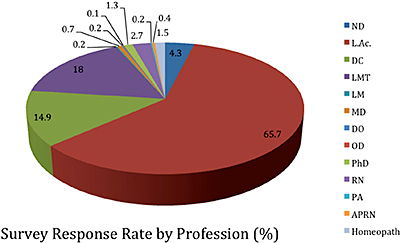
The following are a subset of the survey results representing all of the professions above. (There were a number of questions requiring specific comments on practitioners' experience with insurance companies in their states.)
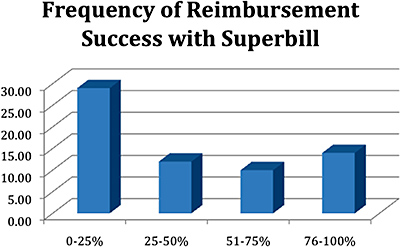
Are you credentialed as a PPO in-network provider and/or a HMO provider?
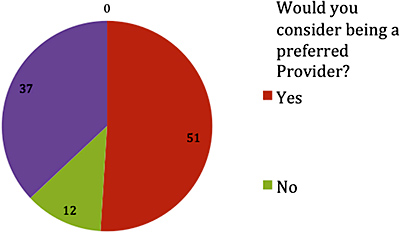
Have you been denied credentialing from a health insurance plan before, or after January 1, 2014?
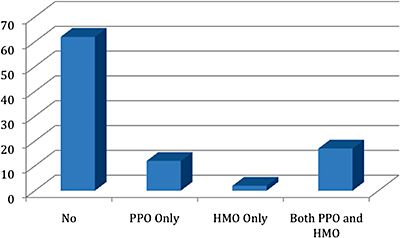
Have your patients been denied reimbursement by a healthcare plan for services you rendered before, on or after January 1, 2014?
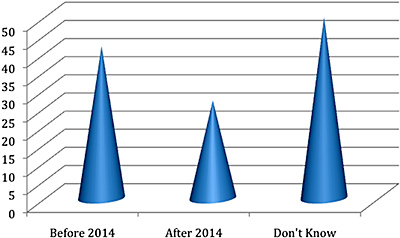
Have you experienced any of the following issues for services you provided on or after January 1, 2014?
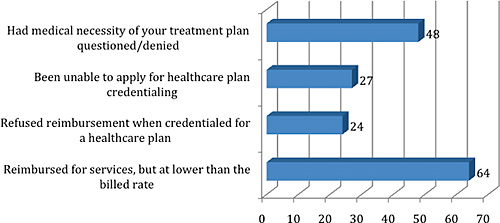
Do you collaborate with local MDs/DOs?
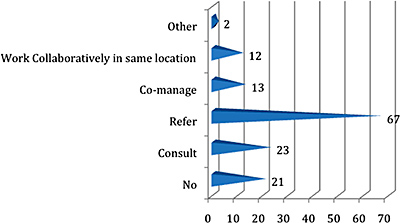
Points to Consider
The IHPC and their Partners for Health organizations collaborated on a response letter to the HHS RFI containing appendices written by the representatives of the professions' national membership organizations. The letter covered the following key points:
- Background on the intended interpretation of Section 2706(a), Title XXVII of the Public Service Act and examples of misinterpretation and confused guidance
- Examples of variable implementation
- Examples of non-discrimination in healthcare preceding Section 2706(a)
- Results of an IHPC survey characterizing the present landscape
- Key recommendations for HHS to consider
- Appendices: statements from IHPC Partners for Health representing licensed healthcare practitioners impacted by discrimination
- Attachments
Attachments to the letter contained a transcript of Senator Harkin's address to the American Association of Naturopathic Physicians (AANP) in Washington, DC, a copy of John Blum's article entitled "Non-Discrimination and the Role of Complementary and Alternative Medicine," and a "Dear Colleague letter" penned by representative Kurt Schrader (OR) stating that the sub-regulatory guidance on section 2706 in the form of a "FAQ" is "misleading, inaccurate, and a threat to the very foundation of the provision. In that guidance, the departments interpret the law in a way that would lead many health plans to believe that they may continue to perpetrate the very type of discriminatory practices which section 2706 aims to stop, such as employing "medical management techniques" or "market standards and considerations" "to discriminate against certain types of providers and the patients that seek their care," encouraging the government to correct the FAQ.
On July 24th, 2014, the U.S. Senate Appropriations Committee filed a report to accompany the Fiscal Year 2015 funding bill for the U.S. Department of Health and Human Services, which includes the Centers for Medicare and Medicaid Services. Page 140 of the report states: "Provider Nondiscrimination.—The fiscal year 2014 omnibus directed HHS to correct the 2013 FAQ on Section 2706 of the ACA to reflect the law and congressional intent. The Committee notes that CMS has not complied with this directive. The Committee expects the corrected FAQ by November 3, 2014, or an explanation for ignoring congressional intent."
In the meantime, the IHPC is working with HHS Regional Directors to ensure this deadline is a priority.
Here is the link to 2706 Frequently Asked Questions (FAQ): http://www.dol.gov/ebsa/faqs/faq-aca15.html and here is the link to John Blum's article: http://www.ihpc.org/wp-content/uploads/JBLum_2706-BNA.pdf
Based on the survey responses, it is clear that the implementation of 2706 is spotty at best. Less than 30% of the respondents had success with patient reimbursement with super bills, almost half (48%) had their charges questioned or denied based on medical necessity, and roughly two thirds (64%) were reimbursed for their services, but below the billed rate. On the bright side, practitioners reported a 32% reduction in reimbursement denials after January 1 of this year compared to 2013, which is encouraging. The survey illustrates that over half of CAM practitioners are willing to consider being preferred providers (51%), but almost 60% are not credentialed as HMO or PPO providers, with one third stating they operate a cash practice. Sixty seven percent of those surveyed coordinate their patient care (i.e. refer to) local MDs and DOs. Wouldn't the US healthcare system benefit if the reverse were true?
We respectfully request that the following be considered:
- Revoke the FAQ issued April 29, 2013 and issue new, unambiguous guidance, as soon as possible so that Section 2706 is understood to prohibit plans from covering a given service when offered by one type of licensed provider while denying coverage when the same service is provided by another type of licensed provider. Model statutory language exists in Washington and Vermont – states with longstanding laws with the same intended outcome.
- Include in the guidance that commercial insurers must allow all types of licensed providers to participate in their network and clearly define terms (such as network adequacy).
- Identify HHS liaisons to serve as representatives/ombudsmen to the states in an effort to provide greater guidance to the state insurance commissioners for uniform implementation.
- Ensure that each state publicly display on their respective websites, the appropriate department and representative to serve as contact for consumers and practitioners related to 2706.
- Encourage legislation to add similar language to the Medicare statutes to ensure consistent non-discrimination and equal access to the full range of health-oriented, person-centered, regulated healthcare professionals.
The IHPC has yet to receive feedback from HHS representatives on the RFI response letter submitted on June 5, 2014. NCCAOM will share news of the HHS modifications to the FAQ and any other policy changes as a result of the CAM professionals' feedback. The IHPC Section 2706 Committee will continue to move forward, educating HHS regional directors on the necessity to enforce the non-discrimination provision in their respective regions, and opening lines of communication to state insurance commissioners.
IHPC is planning to transform the US healthcare system to one embracing integrative medicine. The first step is identifying the top 5 "healthiest" countries according to the World Health Organization (WHO), and the top 5 healthcare systems in the world to find which ones incorporate an integrative medical system.
Additionally, we are researching countries in the European Union, Asia, South America, the Middle East, and everywhere in between. Our target research papers will employ metrics such as mortality rates, pharmaceutical drug use, number of surgical procedures, healthcare expenditures and GDP before and after adoption of an integrative medical system. The next step will be to summarize the results in an easy to read white paper that will be distributed to legislators and constituents. We will interview those pioneers in the countries who have shifted their healthcare systems to include CAM practitioners and find what resistance they encountered and what specific language was used in their legislation. Our ultimate goal is not to replicate any one country's system, but rather to create a hybrid of the best practices we find.
Consider this: Japan has the highest life expectancy (82.5 years) while spending roughly $2,500 per person on healthcare. This is in stark contrast to the pitiful American life expectancy of just under 78 years old corresponding to a healthcare expenditure of $7,250; 344% greater. We cannot, continue spending a huge part of our GDP on health expenses. It's just not sustainable. Our legislators need to do the right thing for our citizens and our economy.
Click here for more information about Bill Reddy, LAc, Dipl. Ac..




